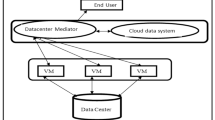Abstract
As a new type of computing resource, cloud computing attracts more and more users because it is convenient and quick service. The cloud server is used by a large number of users, which brings about the problem of how to reasonably schedule resources to ensure the load balance of the cloud environment. With the development of research, scholars have found that the simple job scheduling of physical resources cannot meet the utilization of resources. Connecting the characteristic of resource scheduling in cloud environment and machine learning, researchers gradually abstract a resource scheduling problem into a mathematical problem, and then combine machine learning with group algorithm to put forward the intelligent algorithm which can optimize the resource structure and the improve the resource utilization. In this survey, we discuss several algorithms that use machine learning to solve resource scheduling problems in a cloud environment. Experiments show that machine learning can assist the cloud environment to achieve load balancing.
Access this chapter
Tax calculation will be finalised at checkout
Purchases are for personal use only
Similar content being viewed by others
References
Mell, P., Grance, T.: The NIST definition of cloud computing. Commun. ACM 53(6), 50 (2011)
Lin, W., Qi, D.: Survey of resource scheduling in cloud computing. Comput. Sci. 39(10), 1–6 (2012)
Jiang, X.W., Fan, M.A.: Middleware and distributed computing. Comput. Appl. 22(004), 5–8 (2002)
Arslan, M.Y., Singh, I., Singh, S., et al.: CWC: a distributed computing infrastructure using smartphones. IEEE Trans. Mobile Comput. 14(8), 1587–1600 (2015)
Xiang, J.J.: Research on the key technologies of resource dynamic management in cloud computing environment. Adv. Mater. Res. 926–930, 2618–2621 (2014)
Kim, B.G., Zhang, Y., et al.: Dynamic pricing and energy consumption scheduling with reinforcement learning. IEEE Trans. Smart Grid 7(5), 2187–2198 (2016)
Feng, Y., Zheng, B., Li, Z.: Exploratory study of sorting particle swarm optimizer for multiobjective design optimization. Math. Comput. Model. 52(11), 1966–1975 (2010)
Hou, Y., Lu, L., et al.: Enhanced particle swarm optimization algorithm and its application on economic dispatch of power systems. Proc. CSEE 24(7), 69–70 (2007)
Liu, J., Fan, X., et al.: A new particle swarm optimization algorithm with dynamic adjustment of inertia weights. Comput. Eng. Appl. 43(7), 69–70 (2007)
Shi, H., Bai, G., Tang, Z.: ACO algorithm-based parallel job scheduling investigation on Hadoop. Int. J. Digit. Content Technol. Appl. 5(7), 283–289 (2011)
Jin, Y., Wu, J., et al.: Fairness-considered shortest job first strategy for memory scheduling. Comput. Eng. 38(20), 243–246 (2012)
Liao, J., Zhang, L., et al.: Efficient and fair scheduler of multiple resources for MapReduce system. IET Softw. 10(6), 182–188 (2016)
Berral, J., Poggi, N., Carrera, D., et al.: ALOJA: a framework for benchmarking and predictive analytics in Hadoop deployments. IEEE Trans. Emerg. Top. Comput. PP(99), 1 (2015)
Luo, X., Yue, L., et al.: Research on job scheduling algorithm on wind farms data center cloud platform based on Hadoop. Comput. Eng. Appl. 51(15), 266–270 (2015)
Zhu, L., Li, Q., et al.: Study on cloud computing resource scheduling strategy based on the ant colony optimization algorithm. Int. J. Comput. Sci. Issues 9(5), 54–58 (2012)
Guo, L., Zhao, S., et al.: Task scheduling optimization in cloud computing based on heuristic algorithm. J. Netw. 7(3), 1–4 (2012)
Tsai, P.W., Pan, J.S., et al.: Parallel cat swarm optimization. In: International Conference on Machine Learning and Cybernetics, vol. 6, pp. 854–858. IEEE (2008)
Luo, Y., Yuan, X., et al.: An improved PSO algorithm for solving non-convex NLP/MINLP problems with equality constraints. Comput. Chem. Eng. 31(3), 153–162 (2007)
Bonyadi, M.R., Michalewicz, Z.: Particle swarm optimization for single objective continuous space problems: a review. Evol. Comput. 25(1), 1–54 (2017)
Gomathi, B., Krishnasamy, K.: Task scheduling algorithm based on hybrid particle swarm optimization in cloud computing environment. J. Theor. Appl. Inf. Technol. 7(1), 575 (2013)
Jun, W., Zhang, M., et al.: Cloud computing resource schedule strategy based on MPSO algorithm. Comput. Eng. 37(11), 43–44 (2011)
Yuan, H., Li, C., et al.: Optimal virtual machine resources scheduling based on improved particle swarm optimization in cloud computing. J. Softw. 9(3), 705–708 (2014)
Peng, Z., Cui, D., et al.: Random task scheduling scheme based on reinforcement learning in cloud computing. Clust. Comput. 18(4), 1595–1607 (2015)
Kumar, N., Swain, S.N., Murthy, C.S.R.: A novel distributed Q-learning based resource reservation framework for facilitating D2D content access requests in LTE-A networks. IEEE Trans. Netw. Serv. Manag. PP(99), 1 (2018)
Acknowledgements
This work is supported by Marie Curie Fellowship (701697-CAR-MSCA-IF-EF- ST), the NSFC (61300238 and 61672295), the 2014 Project of six personnel in Jiangsu Province under Grant No. 2014-WLW-013, and the PAPD fund.
Author information
Authors and Affiliations
Corresponding author
Editor information
Editors and Affiliations
Rights and permissions
Copyright information
© 2018 Springer Nature Switzerland AG
About this paper
Cite this paper
Liu, Q., Jiang, Y. (2018). A Survey of Machine Learning-Based Resource Scheduling Algorithms in Cloud Computing Environment. In: Sun, X., Pan, Z., Bertino, E. (eds) Cloud Computing and Security. ICCCS 2018. Lecture Notes in Computer Science(), vol 11063. Springer, Cham. https://doi.org/10.1007/978-3-030-00006-6_21
Download citation
DOI: https://doi.org/10.1007/978-3-030-00006-6_21
Published:
Publisher Name: Springer, Cham
Print ISBN: 978-3-030-00005-9
Online ISBN: 978-3-030-00006-6
eBook Packages: Computer ScienceComputer Science (R0)




